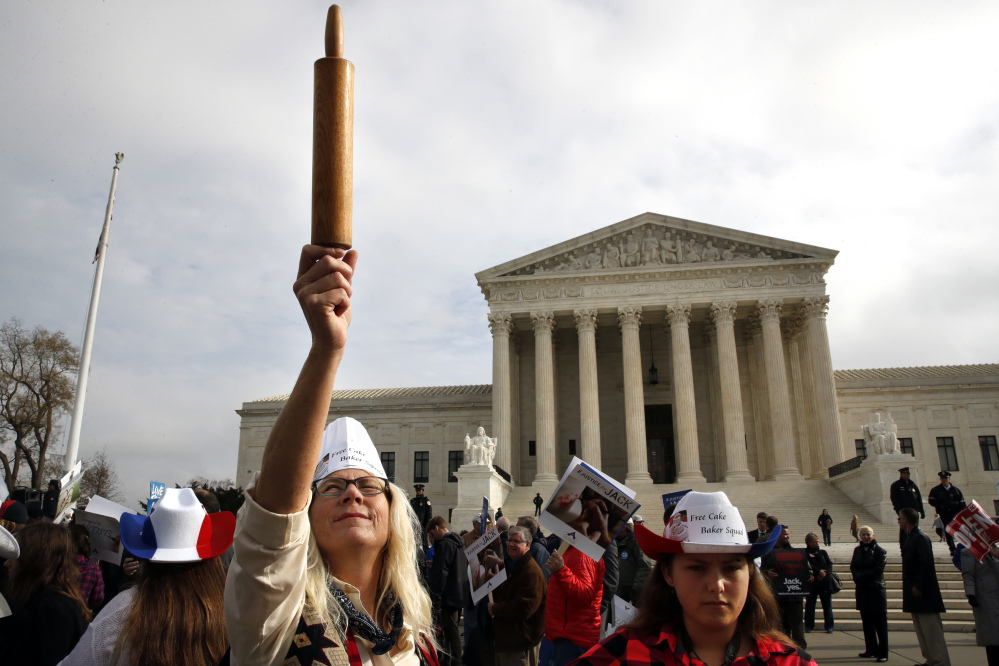It seems everyone is predicting what’s going to happen in the coming year, based mostly on their point of view. The abundance of predictions on what Gov. Janet Mills will do lends truth to that. This column’s predictions are based on the Trump administration’s ongoing assault on the First Amendment’s guarantee of freedom from religion and the separation of church and state.
Some may not notice when these constitutional rights are being violated, particularly when the Trump administration interprets the First Amendment’s free exercise of religion clause as giving everyone the right to violate another’s constitutional rights.
I’ll give an example. The Masterpiece Cakeshop owner Jack Phillips, the baker who refused to make a cake for a gay couple based on his religious beliefs, is back in court. Phillips recently refused to make a cake for a transgender person, claiming being transgender also offends his personal religious beliefs. But who could have known? Because the government cannot regulate anyone’s religious beliefs, Phillips becomes the sole arbiter of what his religious beliefs entail.
With that standard, how can there be any limits to what offends personally held religious beliefs?
In Oregon v. Smith (1990), the Supreme Court affirmed the First Amendment restriction on government regulation of religious belief but ruled the government can limit religious practices if doing so violates applicable laws. As then-Supreme Court Justice Antonin Scalia wrote, to have no restrictions on one’s behavior because of personally held religious beliefs “would be to make the professed doctrines of religious belief superior to the law of the land, and in effect to permit every citizen to become a law unto himself.”
If religious beliefs become the standard on which to discriminate, those who fought for the law will be back in court, protesting, when a Christian is refused service simply because being Christian offended a shop owner’s religious beliefs.
A woman’s right to choose will continue to be assaulted by the religious right in 2019 as well. It is unlikely the Supreme Court will overturn Roe v. Wade; it is more likely the court will let states reduce funding for, and limit access to, women’s health care facilities to achieve the same goals.
Oregon’s Death with Dignity Act was upheld in 2006 by the Supreme Court. Six states and Washington, D.C., have implemented similar laws, and more states, including Maine, considering the same. So with what is now a very conservative Supreme Court, 2019 might be the year conservative religious opponents decide to again press their agenda.
Another religion-based law that just went into effect in Utah reduced the state’s legal blood alcohol limit from 0.08 to 0.05. Republican state Rep. Norm Thurston, a devout Mormon, sponsored the bill, which reflects Mormon teachings on alcohol consumption, targets social drinkers (have two drinks in an hour and you will be legally drunk) and will do nothing to reduce alcohol impaired car accidents.
Matthew Bulger, legislative associate at the American Humanist Association, is concerned that such religiously motivated laws will continue to erode everyone’s constitutional right to freedom from religion and the separation of church and state. “Generally, members of Congress who are more religious tend to be a bit hostile towards legislation that is based on scientific research, either because it conflicts with their faith or because they question the value of knowledge that is gathered outside of their religion,” he said.
One of the groups hostile to legislation based on scientific research is the Freedom Caucus, formed by and, until recently, led by Republican U.S. Reps. Jim Jordan of Ohio and Mark Meadows of North Carolina, both devout Christians. The Freedom Caucus generally supports the Christian dominion agenda that advocates our secular laws be based on their interpretation of the Bible.
Fortunately, 2019 will see the Congressional Freethought Caucus, formed as an antidote to the Freedom Caucus, continue to defend the ideas on which our secular Constitution was written: reason, science, logic, secular values, and the nation’s central founding idea that grants religious freedom to everyone — the separation of church and state.
Fully 25 percent of Americans are nonbelievers. But because of the negative perception of nonbelivers, there exists a de facto religious test for public office. Consequently there are only two members of Congress who openly identify as non-religious.
One Freethought Caucus goal is to allow everyone to exercise their religious freedom, including atheists, agnostics and other nonbelievers. When that is accomplished all Americans can be truly represented by all state and federal elected positions as the Constitution intended.
Tom Waddell is president of the Maine Chapter of the Freedom from Religion Foundation. He can be reached at: president@ffrfmaine.org
Send questions/comments to the editors.



Success. Please wait for the page to reload. If the page does not reload within 5 seconds, please refresh the page.
Enter your email and password to access comments.
Hi, to comment on stories you must . This profile is in addition to your subscription and website login.
Already have a commenting profile? .
Invalid username/password.
Please check your email to confirm and complete your registration.
Only subscribers are eligible to post comments. Please subscribe or login first for digital access. Here’s why.
Use the form below to reset your password. When you've submitted your account email, we will send an email with a reset code.